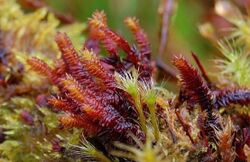Biology:Pleurozia
| Pleurozia | |
|---|---|

| |
| Pleurozia purpurea | |
| Scientific classification | |
| Kingdom: | Plantae |
| Division: | Marchantiophyta |
| Class: | Jungermanniopsida |
| Subclass: | Metzgeriidae |
| Order: | Pleuroziales Schljakov |
| Family: | Pleuroziaceae (Schiffn.) Müll.Frib.[2] |
| Genus: | Pleurozia Dumort.[1] |
| Synonyms | |
| |
Pleurozia is the only genus of liverworts in the family Pleuroziaceae, which is now classified in its own order Pleuroziales, but was previously included in a broader circumscription of the Jungermanniales.[3] The genus includes twelve species,[4][5] and as a whole is both physically distinctive and widely distributed.[6]
The lower leaf lobes of Pleurozia species are fused, forming a closed water sac covered by a movable lid similar in structure to those of the angiosperm genus Utricularia. These sacs were assumed to play a role in water storage, but a 2005 study on Pleurozia purpurea found that the sacs attract and trap ciliates, much in the same way as Utricularia. Observations of plants in situ also revealed a large number of trapped prey within the sacs, suggesting that the species in this genus obtain some benefit from a carnivorous habit. After Colura, this was the second report of zoophagy among the liverworts.[7]
Taxonomy
The genus Pleurozia has been subdivided into three subenera:
- Pleurozia subg. Pleurozia
- Pleurozia gigantea (Weber) Lindberg
- Pleurozia subg. Constantifolia Thiers
- Pleurozia purpurea Lindberg
- Pleurozia conchifolia (Hooker & Arnott) Austin
- Pleurozia subg. Diversifolia Thiers
- Pleurozia acinosa (Mitten) Trevisan
- Pleurozia articulata (Lindberg) Lindberg & Lackström
- Pleurozia caledonica (Gottsche ex Jack) Stephani
- Pleurozia curiosa Thiers
- Pleurozia heterophylla Stephani ex Fulford
- Pleurozia johannis-winkleri Herzog
- Pleurozia paradoxa (Jack) Schiffner
- Pleurozia subinflata (Austin) Austin
- Unplaced
- Pleurozia pocsii Müller
References
- ↑ Dumortier, B. C. (1835). Recueil d'observations sur les Jungermanniacées. fasc. 1. Tournay. pp. 1–27.
- ↑ Müller, K. (1909). Die Lebermoose Deutschlands, Oesterreichs und der Schweiz, mit Berücksichtigung der übrigen Länder Europas. Rabenhorst's Kryptogamen-Flora. Leipzig.
- ↑ Schuster, Rudolf M. (1966). The Hepaticae and Anthocerotae of North America. I. New York: Columbia University Press. pp. 381–384.
- ↑ Thiers, Barbara M. (1993). "A Monograph of Pleurozia (Hepaticae; Pleuroziaceae)". The Bryologist 96 (4): 517–554. doi:10.2307/3243984.
- ↑ Söderström, Lars; Hagborg, Anders; Konrat, Matt von; Bartholomew-Began, Sharon; Bell, David; Briscoe, Laura; Brown, Elizabeth; Cargill, D. Christine et al. (29 January 2016). "World checklist of hornworts and liverworts" (in en). PhytoKeys (59): 1–828. doi:10.3897/phytokeys.59.6261. ISSN 1314-2003. PMID 26929706. PMC 4758082. https://phytokeys.pensoft.net/articles.php?id=6261.
- ↑ Jones, E. W. (2004). Liverwort and Hornwort Flora of West Africa. Scripta Botanica Belgica. 30. Meise: National Botanic Garden (Belgium). pp. 197–198. ISBN 90-72619-61-7.
- ↑ Hess, Sebastian; Frahm, Jan-Peter; Theisen, Inge (2005). "Evidence of zoophagy in a second liverwort species, Pleurozia purpurea". The Bryologist 108 (2): 212–218. doi:10.1639/6.
Wikidata ☰ {{{from}}} entry
 |

